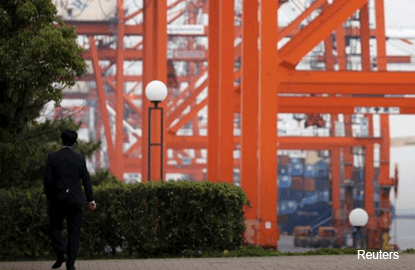
TOKYO (July 25): Japan's exports fell less than expected in June in a tentative sign that overseas demand could be recovering from persistent weakness that set in last year.
A slowing decline in exports could ease concerns for Japan's policymakers as they try to revive growth with stimulus spending on infrastructure after their structural reform plans failed to deliver hoped-for results.
"Exports are showing signs that they have stopped deteriorating," said Norio Miyagawa, senior economist at Mizuho Securities.
"The U.S. economy is a bright spot and should help Japan's exports recover. The (Japanese) government's stimulus plan is designed to help domestic demand, but without broader reforms they are just buying time."
The 7.4 percent annual decline in exports in June was less than the median estimate for a 11.6 percent annual decline seen in a Reuters poll of economists, although it was the ninth consecutive monthly fall.
In volume terms, exports rose 2.9 percent in June from the same period a year earlier, the first increase in four months.
The trade balance hit a surplus of 692.8 billion yen versus a 494.8 billion yen surplus seen in the poll.
Exports fell in June on declines in shipments of cars and steel, the data showed.
Exports to China - Japan's largest trading partner - fell an annual 10.0 percent in June, less than a 14.9 percent annual decline in the previous month.
U.S.-bound shipments fell 6.5 percent year-on-year, considerably less than the 10.7 percent annual decline of the previous month.
Imports were down 18.8 percent year-on-year versus a forecast for a 19.7 percent annual decline.
The yen has risen around 13 percent versus the dollar so far this year, and some Japanese policymakers are worried about further gains that would severely erode exporters' earnings and increase deflationary pressure by lowering import prices.
The government is crafting a massive spending package worth about 20 trillion yen ($187.93 billion), three government sources told Reuters last week.
The BOJ is expected to ease monetary policy at a meeting ending on July 29, a Reuters poll of economists found, to boost anaemic inflation.